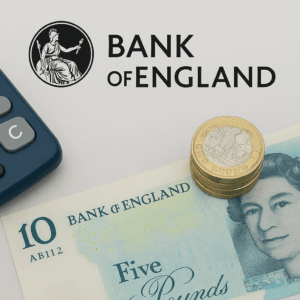
Learn the Connection Between Interest Rates and Your Everyday Budget
To many interest rates can appear as far-off economic abstractions—things that policymakers and market analysts fret about. In reality, though, interest rate decisions made by the Bank of England (BoE) really affect your finances – from the interest you pay on your mortgage, to how much interest you can make on your savings accounts.
In this explainer, we’ll look at how the Bank of England decides what interest rates should be, and why they change, and most importantly, at how that influence feeds through into the rest of your financial life in the U.K.

🏦 What Is The Bank of England Base Rate?
The Bank of England Base Rate is the rate at which the BoE will loan money to commercial banks. It’s this rate that acts as a basis for how much interest these banks charge or pay to consumers on products like:
- Mortgages
- Loans
- Credit cards
- Savings accounts
As of 2025, the BoE’s choices in this rate matter more than ever, now in the age of reconciling the economy growth with inflation targeting.
📊 Why the Bank of England Adjusts Interest Rates
The Monsitory Policy Committee (MPC) of the BoE meets periodically to gauge the condition of the economy in order to decide whether rates should increase, decrease or remain the same.
Factors Determining Their Decision:
- Inflation:
If prices are too high (inflation is too high), the base rate might be increased to cool down spending.
- Economic Growth:
If growth is slowing or the economy is in recession, rates can be cut to stimulate borrowing and investment.
- Employment Levels:
Strong job numbers might justify higher rates, while weak job numbers could lead to cuts.
- Global Economic Trends:
Global events, such as geopolitical conflicts or shifts in trade, can also play a rol in the BoE’s decision-most-making.
💷 The Impact of Interest Rate Changes on Borrowers
When the Bank of England increases the base rate, borrowing costs more.
Effects on Other Types of Credit:
✅ Mortgages
Adjustable Rate Mortgages: These fluctuate with the base rate. A rising rate translates to higher monthly payments.
Fixed Rate Mortgages – These are stable for the term, but new deals can be quite high when the base rate increases.
Example:
As an example, if you have a £200,000 mortgage that has a rate that is variable at 3%, and the BoE increases rates by 0.5%, it could push your interest rate to 3.5%, effectively meaning you pay an additional £50-£70 each month.
✅ Loans and Car Loans
The interest on many personal loans and car finance agreements is fixed, so won’t change mid-term. But additional borrowing will be more expensive at higher interest rates.
✅ Credit Cards
Though not directly tied to the base rate, credit card companies could still increase rates in response to the BoE’s actions, making carrying a balance more expensive.
💰 What Interest Rate Moves Mean for Savers
Rising interest rates can be good news, though, for savers.
✅ Savings Accounts
Savings rates are also increased by the base rate at banks and building societies, which means you could earn more interest on:
Easy-access savings
Fixed-rate bonds
Cash ISAs
For instance, if the rate rose from 0.5% to 1% on a balance of £10,000, your annual interest would double from £50 to £100.
✅ The Catch:
Suppliers are not required to pass along the entire rate increase, and most will postpone or cap increases in an effort to stay profitable.
📈 How Interest Rates Influence Inflation and Your Buying Power
Base rate is very important for curbing inflation.
When rates go up: Borrowing is more expensive, and lending tends to slow, dampening consumer spending and inflation.
When rates drop: Borrowing becomes less expensive and spending more attractive, but inflation can rise.
High inflation means your money has less purchasing power. Even if you’re paid the same, rising prices mean your money is worth less.
By controlling the base rate, the BoE aims to keep inflation at a stable, low level in order to preserve the value of your income and savings.
🛍️ Examples From How Interest Rates Affect You Every Day
✅ Buying a Home
Interest rates on mortgages go up, making those loans more expensive and less affordable. On the other hand, falling rates can help buying a home be more attainable.
✅ Renting
Rising mortgage costs for landlords could result in higher rents.
✅ Shopping and Personal Expenses
When borrowing costs are low, consumers tend to spend more freely, which can help stimulate the economy. Higher rates make saving more attractive than spending.
✅ Employment
Higher rates can depress economic activity, dampening job opportunities in some sectors of the economy, while lower rates can fuel the demand for new hires.
🧮 What Can You Do When Interest Rates Change?
✅ If Rates Are Rising:
Think about securing a fixed-rate mortgage or loan.
Tackle the high-interest debts before they grow more costly.
Shop around for savings accounts that transfer higher rates.
✅ If Rates Are Falling:
Benefit from lower interest rates on essential loans.
Be wary even of fixed-rate savings, which can drag you down as compared to inflation.
Instead, focus on long-term investments that may earn more than low-interest savings.
✅Final Thoughts: Why Interest Rates Matter for You
Debates about the interest rates set by the Bank of England may seem far removed from everyday life, but they shape the financial landscape of the entire UK.
If you own a home, rent an apartment, save for retirement, invest in stocks and bonds, or carry a balance on your credit card (or if you failed to get a credit card because you didn’t have any credit to begin with), interest rates affect how much you pay, how much you earn and how you manage your money.
Knowing how these decisions reach you prepares you to make better decisions on:
- When to borrow
- When to save
- Planning for financial goals in the future
In an era of financial and technological change, with global forces affecting the stock market and interest rates, the importance of keeping track of interest rates has perhaps never been greater than in 2025.
You can protect your assets and be in position to take advantage of opportunities just by having an idea a rate change is coming and if you plan accordingly at the same time you do have debt you can manage it to your favor.
Knowledge about interest rates isn’t just for economists — it’s for anyone who wants to take control of their financial future.
Our Post


The Resilient Pound: Navigating the UK’s New Economic Landscape


